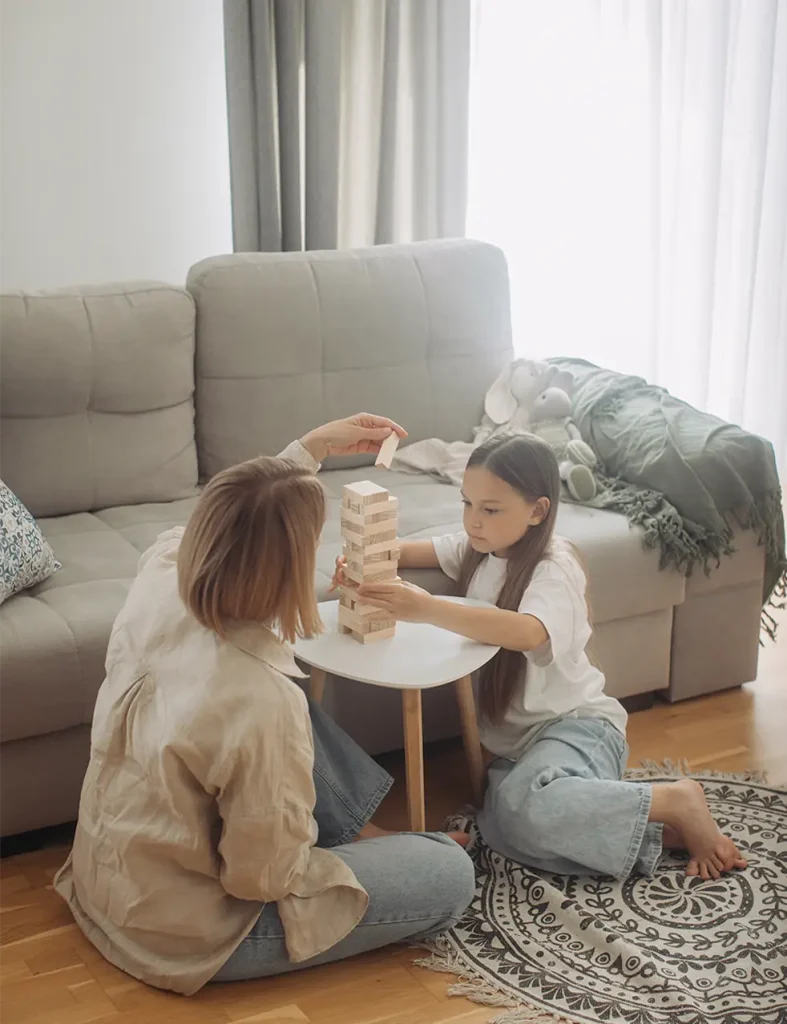Advantage Family Law
Custody & Parenting Time
Resolving Child Custody Disputes in Calgary
Book a Consultation
Advantage Family Law is a Calgary firm dedicated to helping families after separation/divorce. Whenever children are involved, we focus on helping our clients get fair access to custody and parenting time.
After parents separate, their main source of anxiety is often what will happen to the children in the future. As a small legal team, we can meet with you quickly and help ease your concerns about the future with your kids. You have certain rights as a parent and we take steps to make sure your rights are protected.
Legal Knowledge for You
Advantage Family Law has over 20 years of legal knowledge and experience ready to serve your needs. Our senior lawyer, Christopher Bungay, has young children of his own. He is aware of the hard feelings and emotions that come with being a parent. After your separation, Chris does his best to make sure your needs as a parent are met.
Chris has helped clients across Canada for over two decades. Originally from the Maritimes, he travelled from coast to cost during his legal career. Before moving to Alberta in 2019, Chris was the senior lawyer of a large BC law firm that served over 500 clients annually.

Legal Knowledge for You
Chris and his team do their best to handle your child custody issues in a calm and professional manner. We always try and minimize conflict with you and your ex-spouse. If your ex-spouse refuses to be cooperative, we use all the tools at our disposal to ensure your rights as a parent are upheld.
At the present time, Chris is a member of the Alberta Family Law section of the CBA, and a practicing member of the Law Society of Alberta. When he is not spending time with his family, Chris volunteers as the acting president of Sober Kids Canada, a charity that educates families about the dangers of substance abuse.
Advantage Family Law has over 20 years of legal knowledge and experience ready to serve your needs. Our senior lawyer, Christopher Bungay, has young children of his own. He is aware of the hard feelings and emotions that come with being a parent. After your separation, Chris does his best to make sure your needs as a parent are met.
Chris has helped clients across Canada for over two decades. Originally from the Maritimes, he travelled from coast to cost during his legal career. Before moving to Alberta in 2019, Chris was the senior lawyer of a large BC law firm that served over 500 clients annually.
Chris and his team do their best to handle your child custody issues in a calm and professional manner. We always try and minimize conflict with you and your ex-spouse. If your ex-spouse refuses to be cooperative, we use all the tools at our disposal to ensure your rights as a parent are upheld.
At the present time, Chris is a member of the Alberta Family Law section of the CBA, and a practicing member of the Law Society of Alberta. When he is not spending time with his family, Chris volunteers as the acting president of Sober Kids Canada, a charity that educates families about the dangers of substance abuse.




Living Arrangements
& Decisions About Kids
The first step in the process is determining where the kids will live after their parents separate. These issues involve “Custody” and “parenting time”.
“Custody” means which spouse has the children in their home after separation. “Parenting time” means time that a parent is entitled to spend with the children. Custody and parenting time can be shared (where both parents have their kids at different times). Custody can also be “sole custody” (one parent has the children most or all the time).
After separation, spouses will have many questions about the division of property and money. However, the legal system aims to deal with the well- being of children first and foremost. Parents (with or without a lawyer) need to work out a) where the children will live and b) which parent will make important decisions about a child’s future. If parents cannot work cooperatively to decide these issues, ultimately the legal system will make these decisions for them.

Living Arrangements &
Decisions About Kids
In the world of family law, the future of the kids (who they live with/spend time with) always comes down to answering the following question: What parenting arrangement is in the best interests of the child? Our law firm aims to help you, and your ex-spouse find a reasonable answer to this question. We educate our clients on the law and do our best to work cooperatively to find a just solution for you as a parent. Working cooperatively minimizes legal costs and conflict. However, if your ex-spouse refuses to cooperate, we are also here to fight on your behalf.
The first step in the process is determining where the kids will live after their parents separate. These issues involve “Custody” and “parenting time”.
“Custody” means which spouse has the children in their home after separation. “Parenting time” means time that a parent is entitled to spend with the children. Custody and parenting time can be shared (where both parents have their kids at different times). Custody can also be “sole custody” (one parent has the children most or all the time).
After separation, spouses will have many questions about the division of property and money. However, the legal system aims to deal with the well- being of children first and foremost. Parents (with or without a lawyer) need to work out a) where the children will live and b) which parent will make important decisions about a child’s future. If parents cannot work cooperatively to decide these issues, ultimately the legal system will make these decisions for them.
In the world of family law, the future of the kids (who they live with/spend time with) always comes down to answering the following question: What parenting arrangement is in the best interests of the child? Our law firm aims to help you, and your ex-spouse find a reasonable answer to this question. We educate our clients on the law and do our best to work cooperatively to find a just solution for you as a parent. Working cooperatively minimizes legal costs and conflict. However, if your ex-spouse refuses to cooperate, we are also here to fight on your behalf.
Parenting Agreement: Helping You Avoid Legal Costs by Cooperating
A parenting agreement is a document that sets out rules for parenting/custody between you and your ex-spouse. Using our family law knowledge, we do our best to try and help parents arrive at a fair (but legally binding) agreement to avoid future conflict.

Parenting Agreement: Helping You Avoid Legal Costs by Cooperating
These types of agreements usually set out rules/boundaries for the following:
A parenting agreement is a document that sets out rules for parenting/custody between you and your ex-spouse. Using our family law knowledge, we do our best to try and help parents arrive at a fair (but legally binding) agreement to avoid future conflict.
These types of agreements usually set out rules/boundaries for the following:
- Custody (who has the children at certain times)
- Access (set times/days when a parent can see the children)
- Decision-making powers (how major decision s are made by the parents)
- Costs for child expenses - How costs will be paid/by which parent (dentist, sports, etc.)
When Agreement Is Not Possible, We Defend Your Parental Rights
Unfortunately, in many cases, an ex-spouse may not be agreeable. For example, a parent may not want to pay for costs he/she is legally obligated to cover. Your spouse may want more time/access to the children than is legally permitted. In a worst-case scenario, time with another parent may be harmful to the children.
When your ex-partner is being unreasonable, we take action to enforce your rights as a parent. These rights can include the following:
- A right to have appropriate time and access with your children
- A right to be informed of/included in any major decisions about your child’s life
- A right to be free of harassment or abusive behaviour from your ex-spouse
- In many cases, a right to have main custody of the children
Acting in Your Child's Best Interests After Separation
After separation, parents have a legal obligation to act in a way that is in the best interests of their children.

Acting in Your Child's Best Interests After Separation
After separation, parents have a legal obligation to act in a way that is in the best interests of their children.
If your spouse is acting in a negative way, Advantage Family Law can ask a judge to make an order that he/she correct their behaviour. Depending on the circumstances, the following types of court orders may be necessary:
If your spouse is acting in a negative way, Advantage Family Law can ask a judge to make an order that he/she correct their behaviour. Depending on the circumstances, the following types of court orders may be necessary:
- An order that a parent have access to see their children at only set times/days of the week
- An order requiring a parent to cover all or a portion of health costs such as dental
- If there is any risk of harm, an order that any parental visits be supervised by a professional

Frequently Asked Questions
When will it be appropriate for both parents to have “custody” of the children?
“Joint custody” means both parents have custody of the children. In these circumstances, the children live with each parent separately at different times. For example, your child may live with one parent during the week, and the other parent on weekends. In some circumstances, joint custody might involve the children living with each parent 50% of the time.
When determining where the children live after separation, courts always rely on the legal principle of what is in the “best interests” of the children. Unfortunately, what one parent believes is in the best interests of the children is often different than what the law believes is fair.
Shared custody between parents may be appropriate in the following types of circumstances:
- The parents have shown they can cooperate and work together when it comes to decisions about the children.
- The parents each live close to where the children go to school/do most of their activities.
- The parents have shown they can treat each other respectfully and do not undermine each other’s relationship with the children.
What if we have children from a common law relationship? Do I still have rights to custody/access?
If a common law couple separates, a parent has rights to custody/access. There is no requirement that a parent be legally married. If you have a child from any relationship, you have parental rights to custody, access, and in many cases financial support from your ex-spouse as well.
Do grandparents have rights to access/seeing children after a couple separates?
Grandparents do not have the same rights to custody or access for children as parents. The rights of parents will usually be greater than any rights of a grandparent. In most cases, it is up to the parents to allow/disallow a relationship between the child and his/her grandparents after a couple separates.
This said, the law recognizes that grandparents can play an important role in a child’s life. In some limited cases, a judge may order that contact be allowed between grandparents and grandchildren. Some examples are as follows:
- There is a strong history of love and attachment between the grandparents and the child
- The grandparent (s) were largely involved in raising the child
We Help Your Family Relationship
Advantage Family Law has the best interests of you and your children at heart. Your family may change after separation, but your relationship with your kids can continue to be good. We strive to find legal solutions that support both you and your child for a healthy future.
Consultation/Meeting with Advantage Family Law
If you want legal advice about your separation, Advantage Family Law offers a 45-minute, one-on-one meeting with our senior lawyer, Christopher Bungay. This meeting can be online or in-person. The cost of this meeting is $150 plus GST.
At this meeting, Mr. Bungay will listen carefully to your story. He will review the financial history of your family, examining all sources of family income and property. At the end of this meeting, you will be given a legal opinion on your rights and how you should move forward. Arrange a meeting with us at any time by using the “New Client Booking”.
Existing Clients can book appointments with our lawyer using the scheduling icon below. Please be advised only new or existing clients can use this booking system. All other appointments will be automatically deleted with no response. For any other type of inquiry, please email info@advantagefamilylaw.com.